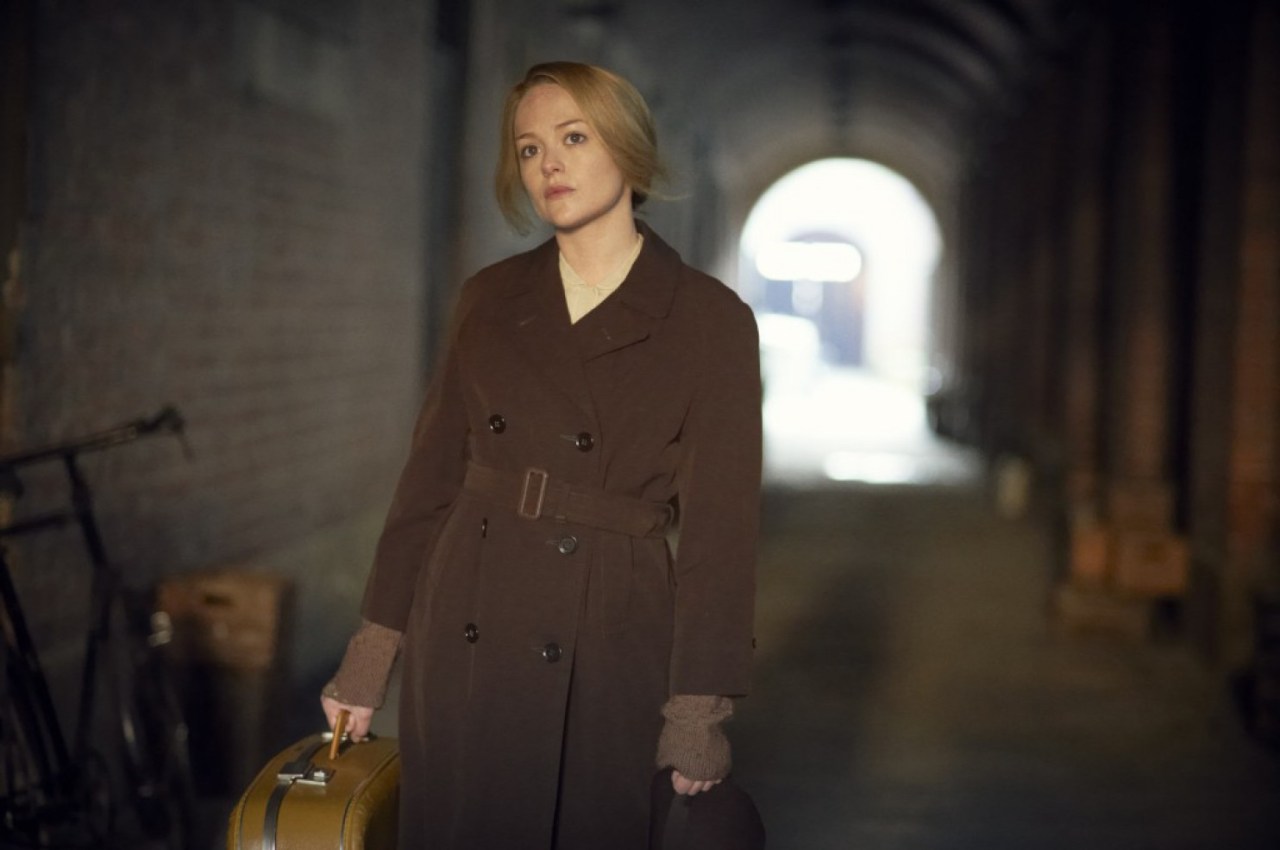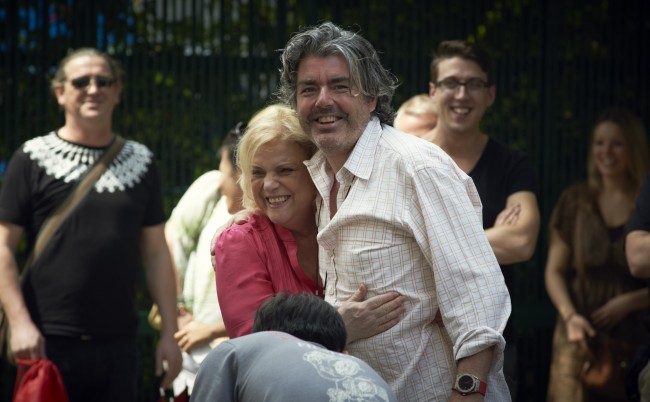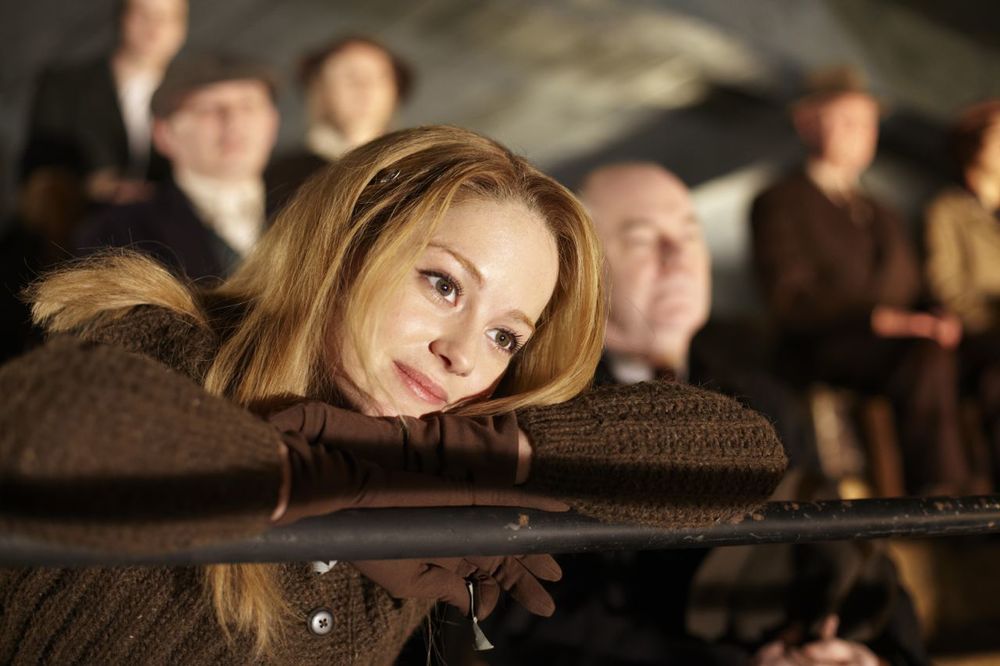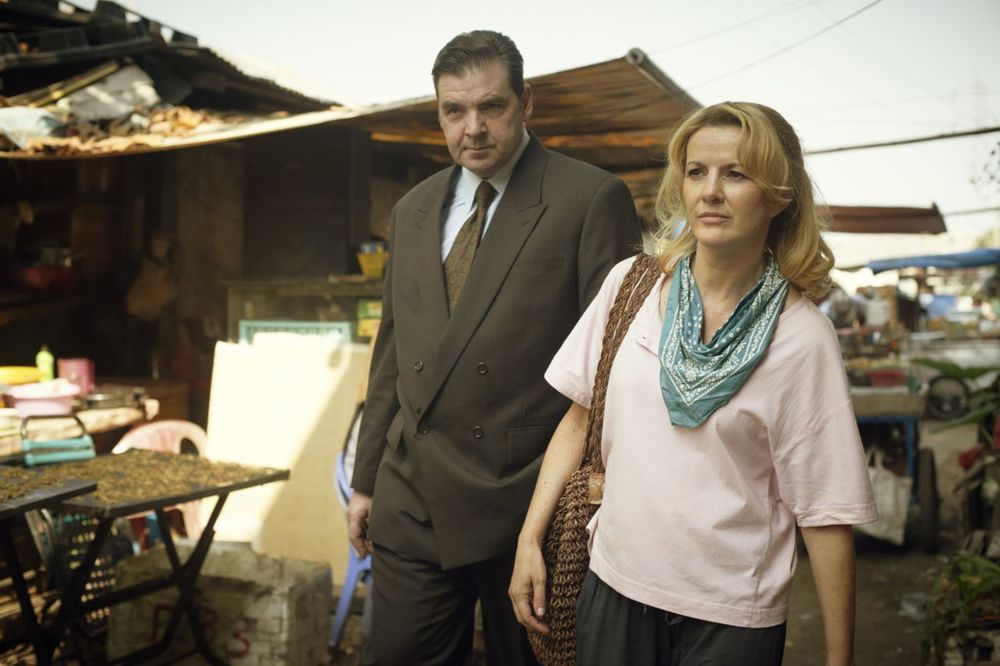Irish filmmaker Stephen Bradley got his start under the tutelage of Oscar nominated director Jim Sheridan, working on the film My Left Foot. Since then he’s moved into writing and directing his own films, along with comedy short documentaries, some with his wife, stand-up comic/actress Deirdre O’Kane.
O’Kane stars in Bradley’s newest film, Noble, a biopic about the life of Christina Noble, who began The Christina Noble Children’s Foundation to help oppressed and marginalized children, and provide them with health, nutritional, educational, and job assistance. The film tells the story of Noble’s life, which led her to Vietnam in 1989 after her own experiences as a homeless orphan as a child and suffering sexual and domestic abuse. Along with O’Kane, Sarah Greene and child actress Gloria Cramer Curtis play Noble at different ages. Bradley spoke about Noble and making a film about this fascinating woman.
Lesley Coffin (TMS): I know Deirdre is known primarily as a comedian in Ireland, so what made you cast her in a drama?
Stephen Bradley: She started out as a dramatic actress actually, and did a lot of theater when she was younger. But what really made her cast her was the fact that the movie was her idea. She’s my wife, and we’ve worked together before on comedy. But on her 40th birthday I asked her what we should do together next, and she said “there is only one story I want to tell, and it’s the story of Christina Noble.” And the reason she wanted to tell her life story so badly was she’d read her books years before and done benefits for her as a stand-up. So that started a two year process of me getting to know Christina and getting her comfortable enough that she would let us tell her life story.
TMS: Did you know about Christina’s life before meeting with her?
Bradley: Once Deirdre suggested the project I read both books. And I could tell from the first book, which most of the film is based on, that her story is a fantastic one to tell. You can’t resist it.
TMS: It is always hard to tell a life story about someone who is still alive. Were you ever concerns that Christina would be too involved?
Bradley: No, because I said to her, you have to try to watch this as if you were another person. And once she got to know me and trust me, she stood back completely and didn’t want to be involved in the making of the film. And she didn’t see the film until it was completed. So she wasn’t involved in making the film at all. And that was very important for me as a filmmaker, because I couldn’t have someone looking over my shoulder all the time. And I wouldn’t have done it under those circumstances.

TMS: When it’s presented as a true story, how much freedom do you have to alter events, or did you feel obligated to stick to the events as they happened?
Bradley: I think I only strayed when I needed to bring something to the forefront. For example, regarding her mother dying and leaving five children alone, and her father leaving the family, I needed a through line, so Ruth Negga’s character Joan, is based on a real Joan, but I made her a much bigger character, and she didn’t go to England with Christina. So there were certain times when I needed dramatic license to make the story work. But they were always based on the truth, and I just extended it.
TMS: Knowing who would play Christine in her 40s, how did you go about casting her as a younger woman and as a child?
Bradley: It is the most important thing from the audience’s point of view. If you don’t get three actresses the audience can believe are the same woman, with the same energy and look alike, then they are just going to reject it. So it was very important to find the right people. Sarah Greene I had seen at the Abby Theater, but she hadn’t done much in film or television at that point. But she had done something called Alice in Thunderland, a political satire of Alice in Wonderland, in which she played Alice and sang and just entranced the audience every night. So when I saw that, I thought it could be a really great match. And then a month later, I did auditions. And I had intended to do loads of auditions, but once I saw Sarah, I was just convinced it would be a match. And they were a fantastic match, because they look alike and have the same energy. And then it became a question of finding a little girl that matched them, and that’s when I found Gloria, who was only 8, but had to play 10.
TMS: Knowing Deirdre at Sarah’s age, did Sarah remind you of her?
Bradley: They were very alike at that age. Deirdre was very like Sarah at that age, so I knew that they would click with the audience as the same person.
TMS: Did all three actresses get to know each other and observe the other’s performance.
Bradley: Yeah, I had Sarah come to Saigon to watch Deirdre filming, because we had to film in Vietnam first. So Deirdre kind of laid down the groundwork for the other two, although she’s probably in at least half, if not more of the film. And once that was locked down, Sarah based her performance on Deirdre, and then Gloria got to see rushes of the two of them.
TMS: How hard is it to film in Vietnam when you don’t know the language or the local crews?
Bradley: The secret was the planning. Melanie Gore-Grimes, who produced the film with me, came to Vietnam, and we found a really good local producer called Star Films. And it took us about 6 months with them to get all the permits and paperwork we needed to film there. And at the same time we were doing all the casting, and finding all the equipment and locations we could use. I ended up bringing about 50 people with me from the UK to film there, and they were my core crew both there and in the UK. So it wasn’t easy, but as long as we gave ourselves enough time upfront, it was okay. But our prep, flying back and forth, took 8 months. Had we tried to rush it, we would never have gotten it done.

TMS: Did you work at all with Noble Foundation in Vietnam?
Bradley: Not really, except for the fact that Christina is so well known in Vietnam, and she knows people in government. I got friendly with the Vietnamese ambassador in London. So it was more that people wanted to help us because of her name recognition.
TMS: When your subject is so respected and beloved, and a foundation exists in her name, is it hard to focus on making a piece of entertainment and avoid making it into a publicity piece?
Bradley: I always kept in mind that this had to be a proper movie. This isn’t a corporate video. It has to work for an audience that has no interest in learning about the Christina Noble Foundation. It must be a piece of entertainment. That was a cardinal rule. But the strength of her story is that she actually is an extraordinary character in real life. And because she said, go off and make the film however you like, it allowed me to structure it however I liked. So the film could be a piece of entertainment first and foremost, and perhaps have a secondary effect on the foundation in the future. I felt pressure from the audience, not the foundation.
TMS: Anytime you tell a story about a Caucasian person who saves and protects children of color, there is always the concern that you are presenting a white savior. How did you counteract that possible complaint?
Bradley: First, the fact that it is an absolutely true story. Second, the fact that she is not someone with a background of privilege, of either money or education. And third, that she was reacting irrationally or because of fate, to make a major change in her life. She was doing something kind of crazy, but as she says, a little madness goes a long way. In her case, the label doesn’t fit at all. She was just bringing her own experiences of similar hardships from her life to these children. And that is the reason I structured the film as I did. The reason she can work with homeless people is because she had been homeless, and they understand that.
TMS: Let’s talk about the structure. It’s told non-linearly, and besides keeping a bit of mystery, what is the purpose of editing it that way?
Bradley: Some reviewers don’t like that you play with the time line, but I find audiences love it. Because it works as a crossword puzzle and forces them to work a bit to find the significance of the whole thing. And you are always finding more significance and meaning by going back and forth. And it is like putting a mirror up to show the connections of her own life to these children. And you come to understand why she was able to do this. We keep finding out where she gets that strength and fight. I call her the terminator, she has that get up and go attitude.

TMS: Did Christina see a connection between life for orphan children in Ireland in the ’40s and ’50s and Vietnam in the ’70s?
Bradley: I think there was a huge connection. The first time I met her on my own to discuss this project, she took me to the Phoenix Park in Dublin which is where we go in the film, and she showed me the hole in the grown she lived in when she was homeless. And then I went to Vietnam and there were very similar places where she discovered homeless kids.
TMS: Did her children provide any insights into what she was like at home before she went to Vietnam?
Bradley: A lot. Her son runs the foundation in Vietnam and has done so for 18 years. He’s the one on the ground guy while she’s off raising money. And her daughter ran the music school there and now runs the foundation in the UK. And her other daughter is psychologist who works with children, although not with the foundation. So I spoke with them a lot about what she was like at home. And they would tell me stories about her always looking after people and coming home from school and finding a homeless man in their house. And there are lots of stories about Christina that I simply couldn’t put in the film. There are another 10 films about Christina which could have been told. I wanted to tell the story of her helping children in Beirut in 2010 during the bombing, but I couldn’t fit it in. Or when her daughter went to Cypress and she got stuck there during a battle, and Christina flew there and got her daughter out, along with a whole bunch of other children. So she’s always doing those kinds of things. She’s a humanitarian at heart and she just can’t help herself. If she saw a homeless person here in New York, she would stop and talk to them and try to get them off the street. And her children tell stories all the time of how she was always like that, but she just waited to make this journey until they were grown up. She needed to fulfill her responsibility to her kids until after they left school.
Lesley Coffin is a New York transplant from the midwest. She is the New York-based writer/podcast editor for Filmoria and film contributor at The Interrobang. When not doing that, she’s writing books on classic Hollywood, including Lew Ayres: Hollywood’s Conscientious Objector and her new book Hitchcock’s Stars: Alfred Hitchcock and the Hollywood Studio System.
–Please make note of The Mary Sue’s general comment policy.–
Do you follow The Mary Sue on Twitter, Facebook, Tumblr, Pinterest, & Google +?








